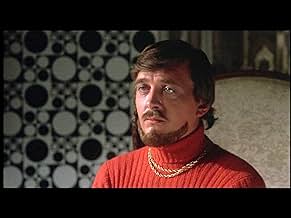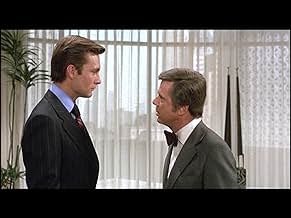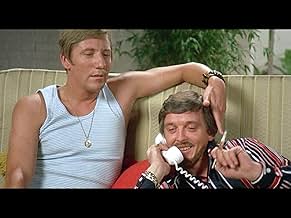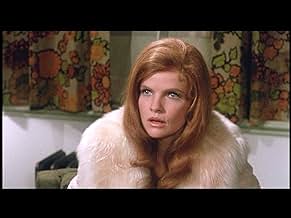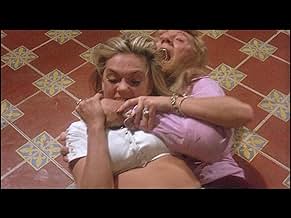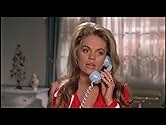IMDb-BEWERTUNG
4,8/10
461
IHRE BEWERTUNG
Füge eine Handlung in deiner Sprache hinzuAn ambitious TV newscaster has an affair with the wife of a network executive to get a promotion.An ambitious TV newscaster has an affair with the wife of a network executive to get a promotion.An ambitious TV newscaster has an affair with the wife of a network executive to get a promotion.
- Regie
- Drehbuch
- Hauptbesetzung
Empfohlene Bewertungen
Though I've only seen it cut for television and therefore may not be able to judge fairly, The Love Machine is a pretty dull ride. The talented, attractive cast seems completely lost. Despite several steamy sex scenes, this suffers from the same problem as Valley of the Dolls--namely, diluting the subject matter of Jacqueline Susann's great novel. A lot of Jackie's most powerful material is either watered down or omitted completely, reducing the proceedings to shallow soap-opera level. The ending is entirely inconclusive. And, unlike Valley of the Dolls, there isn't even that much unintended humor to punch things up. Interestingly, the outrageously gay David Hemmings character is a combination of about three or four characters from the book!
Still, the production looks good, and Dionne Warwicke's renditions of "He's Moving On (Theme from The Love Machine)" and "Amanda's Theme" are beautiful. The rest of the soundtrack is good, too, if you enjoy psychedelic lounge music. I am the proud owner of the LP on Sceptor Records. Worth seeing for fans of Dyan Cannon, John Phillip Law, and moderately sensationalistic trash. It's a harmless diversion, but I still have to agree with Jackie Susann, who was very disappointed with the finished film. It really could've been great.
Still, the production looks good, and Dionne Warwicke's renditions of "He's Moving On (Theme from The Love Machine)" and "Amanda's Theme" are beautiful. The rest of the soundtrack is good, too, if you enjoy psychedelic lounge music. I am the proud owner of the LP on Sceptor Records. Worth seeing for fans of Dyan Cannon, John Phillip Law, and moderately sensationalistic trash. It's a harmless diversion, but I still have to agree with Jackie Susann, who was very disappointed with the finished film. It really could've been great.
The network TV news business as a sleazy cesspool, with John Phillip Law as the titular news-anchor who sleeps his way to the top. Nice idea to have Dionne Warwicke do the song vocals for this movie-adaptation of Jacqueline Susann's bestseller (a la "Valley Of The Dolls")...though it's really too bad this sudser doesn't have Patty Duke's Neely O'Hara to spike the story. "The Love Machine" is unrelievedly dull. Even the final brawl (with an Academy Award as a fight prop!) can't save it. Dyan Cannon seems embalmed in her heavy pancake make-up and cumbersome fall (although her tiny, suntanned figure is a beauty to behold), Law is a handsome block of wood, while David Hemmings is embarrassing in gay-mode as a flamboyant photographer. And where is Robin Stone walking to at the end? Is he trekking out to the waterfront to pick up some sailors? After Cannon has deflated his masculinity, it would be a safe bet. In that case, "Love Machine--The Final Episode" might have been a more interesting flick. Certainly better than this yawn-inducing snooze-opera. *1/2 from ****
The second in Jacqueline Susann's triad of saucy, salacious, showbiz-based novels adapted into movies, this one will delight fans of tacky, trashy film, but may disappoint those who enjoyed the book. Law (in at the 11th hour for a severely injured Brian Kelly) plays an ambitious, sexually-manipulative TV news anchor who catches the eye of a network executive's wife. The wife (Cannon) encourages her husband (Ryan) to hire him on in a higher capacity and before long, he is running the network while the exec is recovering from a massive coronary! He dumps his model girlfriend (Wexler) and takes Cannon to bed. Though Law and Cannon share a couple of blissful unions, Law also canoodles with an endless parade of models, groupies, hookers and anything else in a skirt. It has something to do with an unexplored subplot (fleshed out in the book) of his fear of being alone at night. Apart from the sexual shenanigans (which are suggestive, but not really very explicit), the film also focuses on Law's battles at the network. He tangles with long-term VP Cooper, sets up schlocky comedian Greene with his own series and somehow manages to evade sleeping with office tramp Arthur. It all comes to a head when Ryan begins to recover and wants to take back his reign, but gets considerable resistance from Law. So Ryan considers a smear campaign involving a gay actor (Greyn) and a gay photographer (Hemmings) that Law has been associated with in the past, as friends. The film ends on an ambiguous (to say the least!) note as if the company ran out of film stock. Law is attractive, but uncharismatic and stiff. It's easy to see the physical attraction for him, but impossible to figure out the emotional one. Wexler is extremely weak in her role, though she has several eye-opening appearances in various "high-fashion" get-ups. Ryan adds a tinge of credibility to the film with his firm presence and Cooper is excellent as the threatened second banana. Cannon is severely miscast in her role, but overcomes it rather well. Her ample physical charms are often put to good use (though a few of her ensembles are downright monstrosities that either swallow her up or make her look exceedingly uncomfortable - Check out the green corseted number with the black turtleneck top!) Greene is appropriately low-brow as a sort of in-the-flesh Fred Flintstone who has no class and knows it. Arthur takes her sexpot secretary from "How to Succeed in Business Without Really Trying" and ratchets it up even further, sensually. Hemmings gets in a few catty licks tempered with some down-to-earth moments with a character that is almost completely stereotypical. For a film that was produced by Susann's own husband, the product certainly is a let-down from the book. It seems to remove nearly all of the juiciest aspects of the novel and has an overriding sterile quality (the one exception being a raucous, laughably-overwrought fight scene at the end.) The storyline has been hacked down, but it doesn't feel as if it was completely thought out. Attempts to tie in the "ankh" from the book go nowhere at all and when it's finished it all seems so pointless unless its existence as a snapshot of horrendously bad 70's fashion has historical value. That doesn't mean it isn't fun on a campy level, but it's nowhere near the deliriousness of "Valley of the Dolls".
**SPOILERS** Unintentionally funny 1970's type "Adult Drama" that has funny man Shecky Green, Christie Lane, being so hilarious in a dramatic part where his serious acting comes across funnier then any comedy bit he ever did in Vegas or Atlantic City.
Local Six PM TV newscaster Robin Stone, John Philip Law, has caught the eye of not only CIB network boss Greg Austin ,Robert Ryan, but also his pretty and possessive young wife Judith, Dyan Cannon. Knocking the ladies that he encounters off their feet Robin is the kind of guy who works real fast then quickly checks out without leaving any rings.
Greg putting his newscast on prime time has Robin quickly rises to the top of the CIB network forcing out his former boss, and now partner, top network honcho Danton Miller, Jackie Cooper, and leaving him a man with a job but without any work. Consolidating his power Robin starts to have an affair with Greg's wife Judith that goes on until Greg ends up with a massive stroke, because of the stress of running CIB not the affair which he knew nothing about. With Judith now running CIB and at the same time shearing a bed with Robin as well he on top of the media and entertainment world as a TV personality. What Judith doesn't realize is that her lover now plans to take the CIB network over as president.
Robin would have gotten away with his actions that drove his first lover in the movie Amanda, Jodi Wexler,to down a bottle of sleeping pills and then never waking up again if Robin used his head instead of his emotions he could have avoided the terrible things that later happened to him in the second half of the movie. Like all the Robin Stone type he could never get enough, and never be satisfied, with what he already has and that turns out to be his downfall in the movie "The Love Machine". Breaking careers and hearts on his way to the top Robin starts to get too big for his own good. It's later that Robins boss, the now recovered Greg Austin, has a clause in his contract that can put the Robin Stone steamroller to an end: a morals clause.
Robin for the first time in the movie showed his human side when he got the news that Amanda killed herself on the TV news. Hurt and depressed he roams the streets of NYC at night trying to find himself and the humanity that he lost in his no holds bar climb to the top of the TV news and entertainment heap only to get himself involved with a hooker, Melonie Waller. After changing his mind about doing business with the hooker in her hotel room Robin is humiliated and insulted by her calling him a fa**ot. This sets Robin off to where he beats the living cr**p out of her leaving the hooker for dead as he took off in the dead of night.
Afraid of what this would do to his career, if it's found out by the police and the public, Robin runs to Jerry Nelson, David Hemmings, Amanda's make-up artist who discovered her and made Amanda a star. It's this new found friendship with Jerry that leads to Robin's demise at the end of the film with a battle royal between Jerry and Robin and Jerry's boyfriend Alfie, Clinton Gresn. The three all chase Judith all over and around an empty mansion, with Jerry getting his head cracked open, to retrieve a "Slave Bracelet" that Jerry made out to Robin but in the end gave to Alfie. It was Judith who accidentally found the bracelet thinking that both Jerry and Robin were male lovers.
It turned out that Robin's attempt to get help from Jerry, after the hooker incident, lead to him being suspected of having an affair with Jerry by an outraged Judith, who earlier caught Robin naked in a shower with two young women! Now Judith knows that the carousing and womanizing and, in her mind, bi-sexual Robin can't be trusted. Hurt and vindictive for him tow-timing her Judth wan't to destroy him and his career in show, or the TV news, business.
Funny in a sleazy sort of way the movie "The Love Machine" was released with a lot of fanfare and publicity back in 1971 but flopped in the box office because it wasn't all that effective in the sleaze department, that it was advertised to be. At the same time the movie was so riotous and funny without even trying that it was hyped up for the wrong reasons for getting the public interested in seeing it. It should have been advertised by it's makers as an adult comedy.
Local Six PM TV newscaster Robin Stone, John Philip Law, has caught the eye of not only CIB network boss Greg Austin ,Robert Ryan, but also his pretty and possessive young wife Judith, Dyan Cannon. Knocking the ladies that he encounters off their feet Robin is the kind of guy who works real fast then quickly checks out without leaving any rings.
Greg putting his newscast on prime time has Robin quickly rises to the top of the CIB network forcing out his former boss, and now partner, top network honcho Danton Miller, Jackie Cooper, and leaving him a man with a job but without any work. Consolidating his power Robin starts to have an affair with Greg's wife Judith that goes on until Greg ends up with a massive stroke, because of the stress of running CIB not the affair which he knew nothing about. With Judith now running CIB and at the same time shearing a bed with Robin as well he on top of the media and entertainment world as a TV personality. What Judith doesn't realize is that her lover now plans to take the CIB network over as president.
Robin would have gotten away with his actions that drove his first lover in the movie Amanda, Jodi Wexler,to down a bottle of sleeping pills and then never waking up again if Robin used his head instead of his emotions he could have avoided the terrible things that later happened to him in the second half of the movie. Like all the Robin Stone type he could never get enough, and never be satisfied, with what he already has and that turns out to be his downfall in the movie "The Love Machine". Breaking careers and hearts on his way to the top Robin starts to get too big for his own good. It's later that Robins boss, the now recovered Greg Austin, has a clause in his contract that can put the Robin Stone steamroller to an end: a morals clause.
Robin for the first time in the movie showed his human side when he got the news that Amanda killed herself on the TV news. Hurt and depressed he roams the streets of NYC at night trying to find himself and the humanity that he lost in his no holds bar climb to the top of the TV news and entertainment heap only to get himself involved with a hooker, Melonie Waller. After changing his mind about doing business with the hooker in her hotel room Robin is humiliated and insulted by her calling him a fa**ot. This sets Robin off to where he beats the living cr**p out of her leaving the hooker for dead as he took off in the dead of night.
Afraid of what this would do to his career, if it's found out by the police and the public, Robin runs to Jerry Nelson, David Hemmings, Amanda's make-up artist who discovered her and made Amanda a star. It's this new found friendship with Jerry that leads to Robin's demise at the end of the film with a battle royal between Jerry and Robin and Jerry's boyfriend Alfie, Clinton Gresn. The three all chase Judith all over and around an empty mansion, with Jerry getting his head cracked open, to retrieve a "Slave Bracelet" that Jerry made out to Robin but in the end gave to Alfie. It was Judith who accidentally found the bracelet thinking that both Jerry and Robin were male lovers.
It turned out that Robin's attempt to get help from Jerry, after the hooker incident, lead to him being suspected of having an affair with Jerry by an outraged Judith, who earlier caught Robin naked in a shower with two young women! Now Judith knows that the carousing and womanizing and, in her mind, bi-sexual Robin can't be trusted. Hurt and vindictive for him tow-timing her Judth wan't to destroy him and his career in show, or the TV news, business.
Funny in a sleazy sort of way the movie "The Love Machine" was released with a lot of fanfare and publicity back in 1971 but flopped in the box office because it wasn't all that effective in the sleaze department, that it was advertised to be. At the same time the movie was so riotous and funny without even trying that it was hyped up for the wrong reasons for getting the public interested in seeing it. It should have been advertised by it's makers as an adult comedy.
Even though this film was nothing special as such, I am drawn to comment on at least one factor that ruled in its favour - that of the lead female performer in the film, Dyan Cannon. In spite of the film's ridiculous storyline and what she goes through here, hers was the best acting job in the film, making the unbelievable seem more plausible. Her raucous scene with the gay photographer David Hemmings has to be seen to be believed. Good work, Dyan.
Wusstest du schon
- WissenswertesIt was generally conceded that the inspiration for the Robin Stone character was the controversial (some would say infamous) television executive James T. Aubrey, known as The Smiling Cobra. Aubrey was also in charge of a movie studio, Metro-Goldwyn-Mayer, for a few years in the early 1970s, and is often said to have destroyed that studio.
- PatzerWhen Danton is in the control booth for Christie's first show, Danton's mouth movements don't match the words when he says, "I hope he was funnier than he was in rehearsals."
- Zitate
Jerry Nelson: Dearheart! I am handy, aren't I? She beginning to crowd you already? Ah, my Robin you do play rough. Have you ever felt anything for anyone? I don't mean just girls, I mean a friend?
Robin Stone: I wouldn't know. I never had one.
Jerry Nelson: Not even me? Oh, Robin...
Robin Stone: The thing I like about you, Jerry, is that you never make a pass.
Jerry Nelson: I'm biding my time.
- VerbindungenFeatures Vor Blondinen wird gewarnt (1931)
- SoundtracksHe's Moving On
Music by Bryan Wells
Lyrics by Ruth Batchelor
Sung by Dionne Warwick
[Played during both the opening and closing credits]
Top-Auswahl
Melde dich zum Bewerten an und greife auf die Watchlist für personalisierte Empfehlungen zu.
- How long is The Love Machine?Powered by Alexa
Details
- Erscheinungsdatum
- Herkunftsland
- Sprachen
- Auch bekannt als
- The Love Machine
- Drehorte
- Produktionsfirmen
- Weitere beteiligte Unternehmen bei IMDbPro anzeigen
- Laufzeit
- 1 Std. 48 Min.(108 min)
- Sound-Mix
- Seitenverhältnis
- 1.85 : 1
Zu dieser Seite beitragen
Bearbeitung vorschlagen oder fehlenden Inhalt hinzufügen



